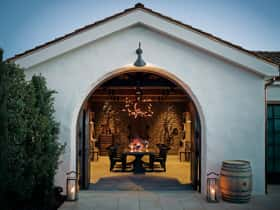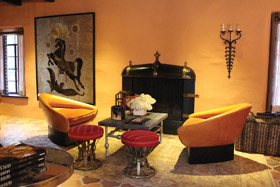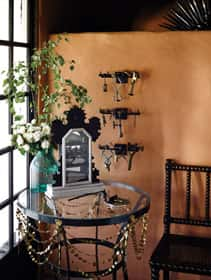 At a Glance
At a Glance143 W. Spain St.
Sonoma, CA 95476
(707) 996-3328
Hours: Mon.-Sat., 10:30 a.m.-6 p.m.
Fees: $35-$70
Wines offered: Chardonnay, Pinot Noir, Cabernet Sauvignon, Pinot Blanc and Casteñada (Rhone blend)
Reservations: Required
Did You Know?
Only one bottle of Three Sticks wine was lost as a result of the Napa quake—it fell off a storehouse shelf and crashed on the floor. The owners decided to leave the stain as a reminder.
Stepping into Three Sticks Wines’ tasting salon in Sonoma is like walking into someone’s home. There’s no big sign in front, and the modest exterior façade might easily be missed if you didn’t know it was there—just like it’s always been.
The salon is located at the Vallejo-Casteñada Adobe. Built in 1842, it’s one of the few structures in Sonoma remaining from California’s Mexican Period (1821-1846). It was first built by Captain Salvador Vallejo, brother of General Mariano Guadalupe Vallejo, the Commandante Générale of the northern territory of Mexico (modern day Sonoma). The Adobe is the oldest and longest-occupied residence in Sonoma, and has only seen a few owners over that long stretch of time.
In 2012, Bill Price, owner of Three Sticks Wines, and his wife, Eva, purchased the property and embarked on a nearly two-year preservation and renovation project. Price is also the owner of Sonoma’s famed Durell Vineyard and Gap’s Crown Vineyard.
 His team, led by COO Prema Behan, worked closely with Sonoma historians and the Sonoma League for Historic Preservation to restore and protect the historic fabric of the property. Price partnered with well-known San Francisco designer Ken Fulk to create a space that would meld its rich history with a contemporary style (it gives a definite nod to mid-century modern—I was coveting some of the furnishings, especially the cognac leather chairs next to the living room fireplace). All materials used for renovating (aside from furnishings, although most are antique or repurposed), including for the added storehouse in the rear of the property, were similar to those used in the Mexican Period.
His team, led by COO Prema Behan, worked closely with Sonoma historians and the Sonoma League for Historic Preservation to restore and protect the historic fabric of the property. Price partnered with well-known San Francisco designer Ken Fulk to create a space that would meld its rich history with a contemporary style (it gives a definite nod to mid-century modern—I was coveting some of the furnishings, especially the cognac leather chairs next to the living room fireplace). All materials used for renovating (aside from furnishings, although most are antique or repurposed), including for the added storehouse in the rear of the property, were similar to those used in the Mexican Period. “We thought the renovation would take about four months,” says Behan. “But about six months in, when we thought we were almost done, we were told the building needed a complete earthquake retrofit. At the time, we were very frustrated—but it was completed only six weeks before the Napa earthquake in August [2014].” A blessing in disguise, for sure.
 During the renovation, a dumpsite was unearthed and the team ended up doing an archeological dig, where they found all sorts of glassware, pottery, dolls, building materials and more. Many of the most interesting items are now displayed throughout the home.
During the renovation, a dumpsite was unearthed and the team ended up doing an archeological dig, where they found all sorts of glassware, pottery, dolls, building materials and more. Many of the most interesting items are now displayed throughout the home. The exterior courtyard features many items that were repurposed from the home’s original garden. It has several sitting areas, benches, tables and fountains. The rear wall of the storehouse features a mural by resident artist Rafael A. Arana (who works for Ken Fulk and who hand-painted the walls inside the home’s thistle room, too). The storehouse (where wine is kept), furnished with a long, wooden table and beautiful wall hangings, was designed by Fulk. You can even see the adobe materials used in its walls.
Tastings are offered by appointment at 10:30 a.m., 1 p.m. and 3:30 p.m. Guests are greeted with Casteñada, a Rhone blend of Syrah, Viognier, Grenache Noir, Grenache Blanc and Marsanne. The grapes are co-fermented and the wine is served slightly chilled. As it warms, its rounded, intricate, sassy and sexy flavors shine through.
“Guests are encouraged to hang out and chill,” says Behan. “They’re given a tour of the property, with as much history about it as they want—everyone is different. Then they can choose four tastes of current releases [changes seasonally] or a library tasting.” The venue can accommodate groups of up to eight guests at a time.
The most well known wines produced by Three Sticks include its Gap’s Crown Pinot Noir and its Durell Vineyard Chardonnay (we tried the 2012 Chardonnay, a silky, lush and full-bodied selection). The 150-acre vineyard is planted with mostly Chardonnay, with some Pinot Noir and Syrah; about 25 winemakers currently use its grapes.
The winery’s first vintage was in 2002 and only 40 cases of Pinot Noir from the Durell Vineyard were produced. Each wine Three Sticks makes is small lot, with only 500 cases or less produced (some as little as 60 or 70 cases), for a total of about 5,000 cases.
“We’re all very passionate about this project,” says Behran. It definitely shows. “The whole point is to remain small, respect the area’s history and provide excellent customer service. Bill and Eva really want this place to be laid-back and welcoming. They want people to feel like they’re in someone’s home.”
They’re doing it right.



